Summary of an open teaching hour on the topic:
“Russia is my Motherland!”
Target: deepen and clarify the idea of the Motherland - Russia, about the state symbols of Russia.
Tasks: 1) Foster love for the Motherland, respect for the state symbols of Russia.
2) To form in children a desire to know more about their homeland.
3) Instill a sense of pride in the country in which you live.
4) Develop logical thinking using didactic games.
Equipment: presentation “Russia is my Motherland!”, audio recording of the song “Where the Motherland Begins”, “Anthem of Russia”, design on the board, didactic material to games.
Progress of the event .
I. Organizational moment. The song “Where the Motherland Begins” is played. The teacher reads a poem against the background of music
What do we call Motherland?
The house where you and I live,
And the birch trees along which,
We walk next to mom.
What do we call Motherland?
A field with a thin spikelet,
Our holidays and songs,
Warm evening outside the window.
What do we call Motherland?
Everything that we cherish in our hearts,
And under the blue-blue sky
Russian flag over the Kremlin.
II. Main part.
Teacher: - Guys, I hope you have already guessed what we will talk about today?(About the Motherland, about Russia)
Indeed, we will talk about our country, about our Motherland. And our educational hour is called “Russia is my Motherland!” The educational hour will take place in the form oral journal. Let's look through the pages of this magazine and see what you and I know about our country, about our Motherland.
PAGE 1.
“What is the Motherland?”
Teacher: - Motherland! Everyone knows this word from childhood. Guys, tell me, what do you think the word Motherland means?(Homeland is the place where you were born, where you live).
In a big country, every person has his own small corner - a city, a street, a house where he was born and lives. This is called the small Motherland.
What is your small homeland like?
That's right, what is the name of our big Motherland?(Russia). What is Russia?(A country)
PAGE 2
"Symbols of Russia"
Teacher: - Each country has its own symbols. What are the state symbols of any country?(Anthem, coat of arms, flag)
That’s right, the state symbols of the country include:
State flag
National anthem
Our country also has them. Tell me, who knows what the State Emblem and the State Flag of Russia look like?
Let's look at them again.
GOS. COAT OF ARMS.
Teacher: Russia has a majestic
On the coat of arms double headed eagle,
So that to the west, to the east
He could have looked right away.
He is strong, wise and proud.
He is Russia's free spirit.
Didactic task: “Cut picture” (children are asked to assemble an image of the state coat of arms of Russia from cut pictures).
(SLIDE SHOW #5)
Teacher: National emblem Russian Federation is an image of a golden double-headed eagle placed on a red heraldic shield; above the eagle are three historical crowns of Peter the Great (above the heads are two small ones and above them is one larger); in the eagle's claws are a scepter and an orb; on the eagle's chest on a red shield is a horseman slaying a dragon with a spear.
This coat of arms says that our country is big, strong, rich, fair.
GOS. FLAG
Teacher: White color- birch.
Blue is the color of the sky.
Red stripe-
Sunny dawn.
Didactic task : “Fold the flag” (children from a set of colored stripes need to fold the country’s flag: - white, - blue, - red).
(SLIDE SHOW #6)
Teacher: The Russian flag consists of 3 colors:
White color symbolizes peace, purity, nobility, perfection, innocence.
Blue – heaven, chastity, fidelity, spirituality, faith.
Scarlet (red) – symbolizes courage, defense of faith and poor people, heroism, generosity, self-sacrifice, fire, mortal combat.
GOS. HYMN
Teacher: What is an anthem?(The main song of the country)
An excerpt from State. Anthem of Russia. The guys stand up and listen while standing.
Guys, why did we listen to the anthem while standing?(As a sign of special respect)
The attitude towards symbols is the attitude towards the state itself. Insulting state symbols is an insult to the state, its people, its history and culture.
PAGE 3
"President of Russia"
Teacher: - Guys, you and I know that the country is led by one person. What do we call it?(President of Russia)
Who knows the name of our president?(V.V. Putin)
PAGE 4
"The capital of our Motherland"
Teacher: Moscow is Red Square.
Moscow is the towers of the Kremlin.
Moscow is the heart of Russia,
Who loves you.
Guys, why do they say that Moscow is the heart of Russia?(Moscow is capital of Russia)
That's right, Moscow is the main city of our country. The Kremlin, where our president works, is located here. It is located almost in the center of the country.
Which of you guys was in Moscow? What interesting things did you see there?(Red Square, Lenin Mausoleum, changing of the guard...)
PAGE 5
"Russian citizen"
Teacher: - How can you name all the people living in our country?(Russians)
People live in Russia different nationalities, With different culture, but they are all Russians.
Russians are citizens of Russia. Guys, do you consider yourself citizens of Russia? Who is a citizen of Russia?
Didactic game: “Seven-flowered flower” (required from the suggested human qualities select only those that characterize a Russian citizen).
Responsibility
Thrift
Politeness
Goodwill
Hard work
Coarseness
Laziness
Sloppiness
III. Bottom line
So, guys, our teaching hour is coming to an end. What did we talk about today? (About our Motherland)
What is the name of our Motherland? (Russia)
What state symbols do we know? (Coat of Arms, Flag, Anthem)
Who are we for our country? (Citizens)
What can a schoolchild do for his country? (Study well, take care of nature, make friends with people...)
I really hope, guys, that you will be worthy citizens of your country. Everyone Thanks a lot, good luck to you! Goodbye!
Goals:
- consolidate students’ knowledge about the state symbols of Russia, the rights and responsibilities of young citizens in society;
- develop oral colloquial speech, watch the pronunciation;
- develop interest in Russian history;
- develop a sense of pride in your country.
Equipment: map of Russia, pictures, cards, photographs of Prokopchan heroes, a film about the war, audio recordings of songs.
Progress of the lesson
I. Organizational moment.
What's your mood?
a) Setting up the equipment. *Names.
b) Phonetic exercise *Installation
a _ o _ _ ta to that constitution ra ro ru Russia, Rus'
Constitution – ... (basic law)
Our Motherland - ... (Russia)
Complete it, add spelling marks.
Result of f.z.
II. Report the topic of the lesson.
*Attitudes for activities.
What do we call Motherland?
Student. The house where you and I live,
And the birch trees along which
We walk next to mom.
Where do you live, …?
Ask ... where he (s) lives? (Organization of dialogue)
What city are you studying in?
Student. In the city of Prokopyevsk, Kemerovo region. (Work according to the map)
Homeland is the place where you live with your parents and friends. Every person has a city or village where he was born, lived and studied. This is his little homeland. Our common, great homeland consists of many such small corners.
What is the name of our homeland?
Student. Our Motherland is Russia. The capital of Russia is Moscow (work on the map)
So, the topic of our lesson is “Our Motherland – Russia”
III. Conversation.
1. State symbols, rights and responsibilities of young citizens.
What do we call Motherland?
Student. Everything that we cherish in our hearts,
And under the blue-blue sky
Russian flag over the Kremlin.
The constitution states that we must respect the state symbols of the country.
D/i “State symbols”
Student. White color - birch,
Blue is the color of the sky,
Red stripe – solar dawn. (About the flag)
Student. Russia has a majestic
The coat of arms has a double-headed eagle,
So that to the west and east
He could have looked right away. (About the coat of arms)
What else do you know about the constitution?
Student. The Constitution is the basic law of the state, which sets out the rights and obligations of citizens.
Guys, what rights do children, as citizens of Russia, have?
Children create a stand “Children’s Rights”
Now remember what responsibilities schoolchildren have.
Children create a stand “Responsibilities of Schoolchildren”
2. Russian holidays.
What do we call Motherland?
Student. A field with a thin spikelet,
Our holidays and songs,
Warm evening outside the window.
D/i “Holidays of Russia”
3. Physical exercise. (Music “My Motherland”)
4. Russia is a multinational state.
Russia is the largest state in the world. All citizens living in Russia are Russians according to the Constitution. More than 180 nationalities live in our country. And they all make up one and friendly family. There is a proverb:
When a people is united, it is invincible (choral reading)
Poems (read by children)
Live in Russia different peoples from a long time ago.
Some people like the taiga, others like the expanse of the steppe.
Each nation has its own language and dress.
One wears a Circassian coat, the other puts on a robe.
D/i “Russia is a multinational state”
5. Heroes of the Great Patriotic War.
Many trials befell the Russian people. One of them is the Great Patriotic War.
When did the Great Patriotic War begin?
When did the war end?
Name the heroes - Prokopchan.
Students. Azarov Evgeniy, Dyuzhev Mikhail, Chechenev Mikhail, Shelomtsev Nikolay, Gnedin Viktor, Chernov Grigory, Zonov Panteley, Shultz Mikhail, Maltsev Mikhail, Shishkin Mikhail, Ulanin Dmitry, Buslov Fedor, Selivanov Evgraf, Kolpanov Peter, Chernykh Ivan, Martekhov Vasily.
Poems (read by children)
How many children have their childhood restored?
Gave joy and spring
Private soldiers of the Soviet army,
People who won the war.
The bright memory of them is alive,
And we will always remember the dead.
Honor, honor, praise to all heroes.
We remember the dead while standing.
Music, a film about the war, everyone standing honors the memory of the dead.
IV. Summary of the lesson.
Poem (read by student)
Some love autumn, others love spring.
And we all have one Motherland, Russia.
I wish you to grow up to be real citizens who know and respect the history of their country, its national characteristics. And so that you are proud of your Motherland - Russia.
Gifts for children (notebooks “I am proud of Russia”)
- *What did we do?
What do you think, how did you talk today, how did you work?
Assessment of the activities and speech of pupils.
Literature
1. E.N. Stepanov “Planning educational work in the classroom”, Moscow, 2002.
2. I.V. Koltunenko “Development of speech of deaf schoolchildren”, Moscow, 1980.
3. V.A. Stepanov “Our Motherland – Russia”, Smolensk, 2008
Ekibastuz kalasy akimdigi Public utility state
biliminal No. 4 “Birch”
bobekter bakshasy
government enterprise
“Nursery – garden No. 4 “Beryozka”
Kommunaldyk Memlekettik Department of Education
Kazynalyk kasiporny akimat of the city of Ekibastuz
"Where the Motherland Begins"
Group "Karlygash"
Conversation

Objectives: To foster a sense of love and respect for the Motherland, native land, to my native
nature. Form an emotional perception of the image of nature by means
fiction, music, visual arts using
natural material. Create conditions for reflection in your works
ideas about their place of residence as one of the “corners” of their homeland.
Develop creative imagination composition skills. Bring up
patriotic feelings, interest in knowing one’s homeland.
Progress of the conversation:
Educator: Children are the flag of our country. Today we will talk to you about our
The Motherland, about the country in which you and I live.
Our city is just a small piece of a huge country called
Kazakhstan. You've already heard this name, let's say it together:
“Kazakhstan”, to better refer to the name of our country in which we
we live. Many poems and songs have been written about our country, about Kazakhstan. Our guys
the country is so big that if we want to travel from one region to another, then
The fastest plane will have to fly all day. Our country is so big
that when it’s night in one region and all the people are sleeping, on the other side of the country, in others
in towns and villages the boys play. It’s cold in one part of our country, and in the other
this time is very hot. This is how amazing our country is.
We are glad that we have such a good, big, beautiful country- our Motherland. Guys,
How do you understand the word Rodina (what does the word Rodina mean to you)?
Children's answers: Our village, river, sky, meadow, kindergarten, field, house, street and
etc.
Yes, guys, because every person’s life is closely connected with their native land. Homeland for
for us this is our native land. Here he was born, here are his parents, here is his native
Earth. And, if he has to part with his native land for a long time, he takes with him
a pinch of native land, so as not to feel cut off from the Motherland.
I really like the words of Z. Alexandrova.
The teacher reads the poem “Motherland”
If they say the word Motherland,
Immediately comes to mind
Old house, currants in the garden
Warm poplar at the gate
Our native land begins for us with our city, with the street where your house is, with
the kindergarten you attend and beautiful park where we rest and come
bow and lay flowers at the monument to fallen soldiers. Well, you can't help but
say about the white-trunked birches that decorate our park.
Guys, we learned poems about the birch tree, let's read it.

I love white birch
Sometimes bright, sometimes sad
In a light sundress
With handkerchiefs in pockets
With red clasps
With green earrings
I love how elegant she is
Dear beloved one,
Then young, ebullient,
Then sad, crying.
Yes, guys, the birch tree and the rowan tree in our garden are all our homeland.
Let's tell proverbs about the Motherland and our native land:
Everyone loves their own side.
The native land is sweet even in sorrow
Do not spare your strength or your life for your Motherland.
There is no land more beautiful than our Motherland
A man without a homeland is a nightingale without a song.
Native land - die, don’t go
The Motherland is your mother, know how to stand up for her.
A person has one Mother and one Motherland
Peace builds, but war destroys.
Who fights hard for his homeland is a true hero
Autotraining – Close your eyes and imagine that we are back in the park
among the white-trunked birches, we listen to the rustling of leaves, this is also a particle
our Motherland.
Let's breathe in the fresh air and be transported back to kindergarten.
Guys, you asked me why we make blanks - silhouettes
birch trees, today I’ll tell you. Since we visited the park, we will
decorate birch trees different time of the year. In spring, what color does the birch tree have?
Educator: In the summer, what? In the fall, which ones? In winter, which ones?
Think about who would like to depict a birch tree at what time, take it for
this required material and get to work.
At the end of the work, the children tell who painted the birch tree at what time.
Communication conversation with children "What we call Motherland"
Goal and tasks:promote the manifestation of patriotic feelings and love for the Motherland;
to form a spiritual and moral attitude and a sense of belonging to home, city, country;
consolidate the concepts of symbols of Russia, matryoshka, balalaika.
activate and expand your vocabulary.
Equipment: exhibition “My Motherland” (books, symbols of Russia, souvenirs, etc.), tricolor flags, music. Instruments, CD music.
Educator: Today you and I must answer the question “What do we call home?”
What kind of word do you think this is? Yes, this is the place where you were born, but not only. The word homeland is much more than just a place of birth.
We love our homeland and sing beautiful songs about it. Listen to the song called “Motherland”. What is the name of the country in which we live?...
Let's remember the symbols of Russia? (Flag, coat of arms, anthem)
A flag is a symbol of a country.
White is the color of birch, Blue is the color of the sky.
Red stripe - Morning dawn.
How can you describe the color of the flag in one word?
Now listen to the Russian anthem. What kind of music is this (in character?) How does it sound? How is it different from other songs? You and I listened to the anthem. This main song countries?
Q: Tell me, what else is a symbol of Russia? What did poets write poems about, and composers songs about? (Birch) Artists also admire the beauty of the Russian birch. They painted many pictures about such a beautiful tree. (showing illustrations)
How beautiful the birch tree is, Like a Russian soul!
Reading the poem Inessa Ageeva BIRCH
The white-trunked birch is a symbol of my Motherland.
There is no other tree dearer to the Russian heart.
Emerald in spring, And in winter - in silver,
Waving a golden branch to all the children in September.
Each leaf is like a heart, admire it, look.
Plant a birch tree on your loved one’s porch.
Q: Now let’s stand in a round dance and sing the song “There was a birch tree in the field” (physical min.)
Here is such a beautiful round dance song about our birch tree.
Guess the riddle:
Triangular board,
And there are three hairs on it.
The hair is thin,
The voice is clear.
The teacher shows the music. tool.
What is the name of the wooden doll - also a symbol of our homeland. (matryoshka)
Conquered the whole of God's world Russian souvenir,
And half a meter and the size of your palm, the bright doll is a matryoshka doll.
Q: And so that we can live well and peacefully in our country - Russia
The dear army is the defender of the country,
Weapons and courage protect us from war!
Q: So what do we call the Motherland, guys? ………..That's right.
Our little Motherland is also a kindergarten and a sanatorium where you are now resting. This is your home and family: mother, father, grandmother, grandfather. This is also the city in which we live.
Our city…..(St. Petersburg) is the most beautiful and beloved and the capital Russia is the main one Moscow city)
What do we call Motherland?
Everything we cherish in our hearts.
And under the blue, blue sky
Russian flag over the Kremlin.
What do we call Motherland?
The house where you and I live.
And the birch trees along which,
I'm going with my mother.

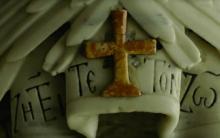
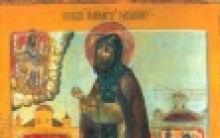
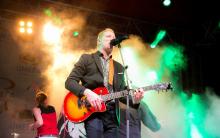
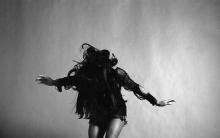
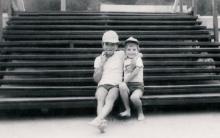
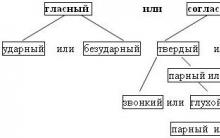




Conventional graphic symbols
The problem of the presence of petroleum products in water and how to deal with it See what “PND F” is in other dictionaries
About a six-day work week With a 6-day
What is a social worker?
Root hermitage in the Kursk region: the story of a miracle Root hermitage prayer service for the sick